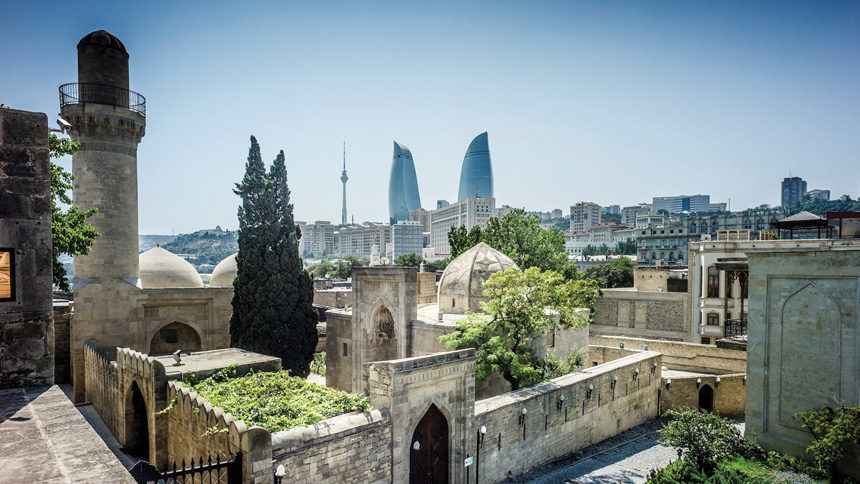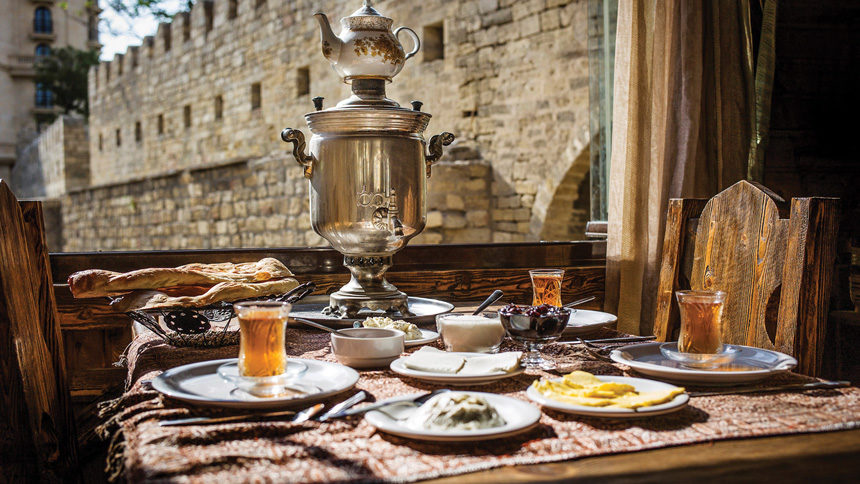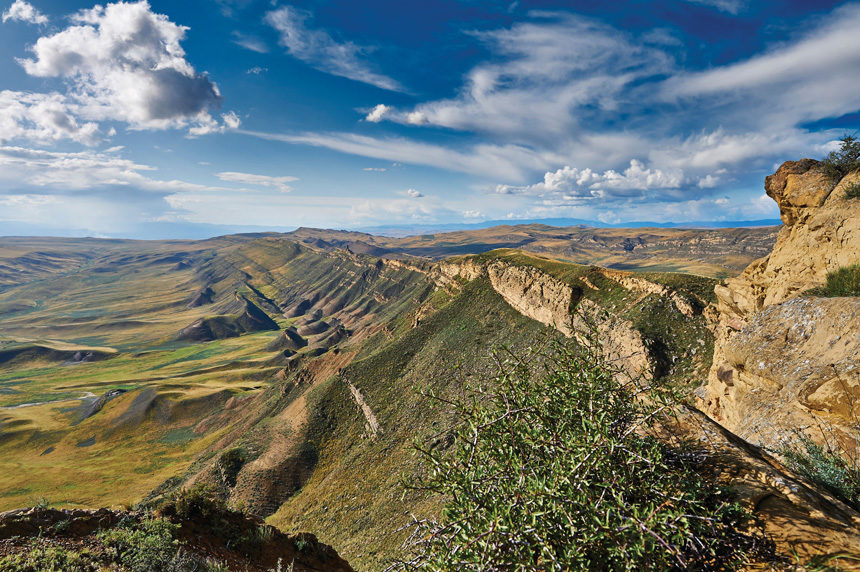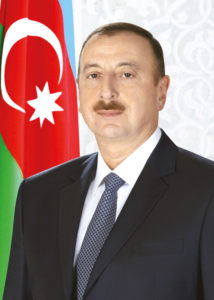
Knowledge
Azerbaijan: A living example of unity in diversity
March 20, 2018
Ambassador Vaqif Sadiqov takes us into a country that practices multiculturalism, a country where people experience multiple religions, languages, and ethnicities every day. He takes us into a history that explains why Azerbaijan became a living example of unity in diversity. He calls on us to embrace universal values, and to foster dialogue and rapprochement between cultures, civilizations, and religions.
Ambassador Vaqif Sadiqov takes us into a country that practices multiculturalism, a country where people experience multiple religions, languages, and ethnicities every day. He takes us into a history that explains why Azerbaijan became a living example of unity in diversity. He calls on us to embrace universal values, and to foster dialogue and rapprochement between cultures, civilizations, and religions.
By Ambassador Vaqif Sadiqov
20/03/ 2018
·
- Share
We are living in a critical global context, marked by unprecedented threats to peace and security. The international community must collaborate more seriously and effectively to reduce the dangers associated with wars and armed conflicts and their devastating consequences. We must also address many other phenomena: tense political conflicts and their implications for civil peace, widespread ethnic and religious conflicts that undermine stability, unprecedented movements of human populations accompanied by acute humanitarian crises, the growing trends of hate and racism in many places, and the flagrant violations of international law resulting from bellicose arrogance by states. These are the direct consequences of the growing number of inter- and intra-state conflicts, with acts of ethnic and cultural cleansing fueled by radicalization and violent extremism, acts that expose millions of men and women to immense suffering, with youth being the most affected.
The number of people displaced by conflicts and violence around the world is now estimated at 65 million, the highest figure since World War II. Around the world, some 130 million people are in need of humanitarian aid. Around the world, climate change, population growth, natural and human-made hazards, and weak political and economic systems continue to put people at risk. The solutions to the crises that have plunged these people into desperate hardship are neither simple nor quick.
The 2030 United Nations Agenda for Sustainable Development represents a new commitment to global action, inspired by the values and principles of the UN, and an integrated response to the cultural, social, economic, and environmental challenges of today. As the leading global entity in the field of culture, UNESCO is championing the cause of education for children and youth affected by crises. This is why it is necessary to embark upon the new 2030 Agenda to ensure inclusive societies for the present generation and the generations to come. In this regard, those involved in education will find that UNESCO’s Strategy for the Protection of Culture and the Promotion of Cultural Pluralism in the Event of Armed Conflict is highly pertinent in efforts to prevent violent extremism.
It is in this work that notions of respect for diversities and sharing common values come into play. This is where the concept of multiculturalism becomes not only relevant but crucial.

View of Baku Old City, including the Palace of the Shirvanshahs and Maiden Tower. Often referred to as an open-air museum, the Old City joined the UNESCO list of World Heritage Sites in 2000.
These days, we do hear pessimistic thoughts related to multiculturalism expressed in many countries, particularly in Europe. Some believe that multiculturalism has failed; others even call it harmful, and think it should not be allowed to flourish. These are very alarming thoughts and approaches. What are the alternatives to multiculturalism? Do any exist? They do, of course, but what are they?
It is obvious that the alternatives to multiculturalism are xenophobia, discrimination, racism, Islamophobia, and antisemitism, which are extremely dangerous trends. Politicians and scientists are talking about a ‘dialogue between civilizations’, but in reality we already see early manifestations of clashes between civilizations. Therefore, these issues must be placed, immediately, on the political agendas of the individual countries and of the UN. Positive attitudes must prevail, and we have to develop the habit of speaking openly about difficult issues.
This is becoming important in a globalized world where people with different cultures, histories, religions, and beliefs are now coming closer together. UNESCO’s Constitution states that ignorance of each other’s ways and lives has been a common cause, throughout the history of mankind, of that suspicion and mistrust between the peoples of the world through which their differences have all too often broken into war.
Amidst these serious challenges and threats to world peace and security and in the context of a sweeping globalization, it is the duty of intellectuals and opinion leaders to make the right moves to stand up for universal values and to foster dialogue and rapprochement among cultures, civilizations, and religions.
My country, Azerbaijan, is proud of its history and diverse culture, its rich material and cultural monuments, and its heritage of literature, arts, and music. Located on the western shore of the Caspian Sea and bordered by Muslim Iran and Turkey, and Christian Armenia, Georgia, and Russia, this country of 9,800,000 mostly Shia Muslims is noteworthy for its long tradition of accepting its numerous ethnic and religious minorities. One of the oldest mosques in the world is located in Azerbaijan: the Juma Mosque, built in 743, in the town of Şamaxi. We also have one of the oldest churches in the Caucasus: the 12th-century Church of Kish, which was the Caucasian Albanian Apostolic church, near the city of Şaki. Not far from Baku is the Ataşqah Zoroastrian temple of fire worshipers, built in the 17th century.

Any guest to an Azerbaijani home will be offered tea – a sign of genuine hospitality. Samovars are used to boil the water for the çay, which is then served in an armudu, a tulip-shaped glass.
The lifestyle of the local people, their aesthetic tastes, and the national image and qualities are strongly reflected in the arts, both traditional and modern. Pieces of Azerbaijani arts created by skillful craftsmen in the ancient Azerbaijani cities of Baku, Ganja, Nakhichevan, Tabriz, Şuşa, Gazakh, Quba, Şaki, and Şamaxi can be found in many museum collections, including the Victoria and Albert in London, the Louvre in Paris, and the Metropolitan in Washington, DC, as well as museums in Vienna, Rome, Istanbul, Berlin, Tehran, and Cairo, and the list continues.
It was in Azerbaijan that the first secular democracy in the Muslim world—the Azerbaijani Democratic Republic—was established in 1918. But throughout its history, it has always been a multi-confessional and multi-ethnic country. Women in Azerbaijan were granted the right to vote as early as in 1918, thus making Azerbaijan the first Muslim country to enfranchise women.
Located at the juncture of two continents, Europe and Asia, Azerbaijan has passed laws and set up conditions that allow people of various ethnic groups and confessions to live together freely, and to preserve their culture, traditions, religion, and language. The state is committed to its strategy of developing and strengthening the traditions of multiculturalism; this is the most important asset for peace, diversity, and harmony in Azerbaijani society, whatever the political systems that dominated the country at different periods of its history. The development of multiculturalism and tolerance at the level of state policy in Azerbaijan, which is a secular state, is based on the country’s ancient history of statehood and on developing these traditions at present. Article 48 of the Constitution of Azerbaijan ensures freedom of worship: people may choose to practice any faith, or to not practice any religion, and to express their views on religion.
The 1992 national law, On Freedom of Faith, ensures all human beings the right to determine and express their views on religion and to execute this right. According to paragraphs 1—3 of Article 18 of the Constitution, religion acts separately from the government, and all religions are equal before the law; it also prohibits propaganda about religions, attacks on human dignity, and anything contradicting the principles of humanism. Azerbaijan has never had any confrontation or misunderstanding on religious or ethnic grounds; I see this as one of its greatest achievements.
Today, Azerbaijan serves as a model for peaceful coexistence among people of diverse cultures. Historical monuments of all religions—whether mosques, churches, or synagogues—are protected by the state, which also provides funds for their restoration. Currently there are more than 650 registered religious communities in Azerbaijan; 37 of these are not Islamic, including 13 functioning churches.
The Russian church building of Jen Mironosets, built in 1907 by the Azerbaijani oil industrialist Haji Zeynalabdin Tağiyev, was granted to the Russian Orthodox Church in 1991. In May of 2001, while Aleksiy II, the patriarch of All Russia, was on a visit to Azerbaijan, he granted this building the status of a cathedral. In addition, there are three Russian Orthodox churches in Baku, one in Ganja and one in Xaçmaz.
The Catholic community was registered in Azerbaijan in 1999, and Pope John Paul II visited Azerbaijan in May of 2002. After his visit, the government of Azerbaijan developed an agreement with the Holy See, and in 2007, St. Mary’s Catholic Church was constructed in Baku, to replace one that had been demolished 70 years ago, during the Soviet period. The new church was inaugurated on 7 March 2008, by the Vatican Secretary of State, Cardinal Tarcisio Bertone. In 2016, Pope Francis visited Azerbaijan. He praised it as a place of religious tolerance and held an interreligious meeting at the country’s largest mosque; that meeting included confessional leaders of the Orthodox, Catholic, Muslim, and Jewish communities.
The first Jews settled in Azerbaijan over 2,500 years ago. Currently 6 Jewish religious communities are registered here, and 7 synagogues are functioning in the country. There are three communities of Jews (Mountain Jews, Ashkenazi Jews, and Georgian Jews) in Azerbaijan, in the cities of Baku, Quba, and Sumgait, respectively. In 2000, Sheikh-ul-islam Allahşükür Paşazade, the Muslim leader of Azerbaijan, donated US $40,000 to construct the Jewish House in Baku. On 9 March 2003, a new Jewish synagogue, now the largest in the Caucasus, was opened in Baku, and a Jewish school has been operating in Azerbaijan since 2003.
Thanks to the national consensus on multiculturalism, and the public support for it, along with material and financial assistance from local authorities, there are currently dozens of schools, cultural centers, theaters, associations, and societies connected to the many ethnic communities and groups in Azerbaijan. Among these communities are Tatars, Ukrainians, Russians, Georgians, Ingiloyans, Mountain Jews, European Jews (Ashkenazi), and Georgian Jews. Among the cultural centers are Ronai, the Kurdish cultural center; Orain, the Udin cultural center; Polonia, the Polish cultural center; Kapellhaus, the German cultural society; Tugan-Tel, the Tatar culture society and Yashlyg, the Tatar cultural center; as well as cultural centers of the Chechen, Talysh, Tat, Budug, and Tsakhur communities. Among the societies and associations are the humanitarian associations of Jewish women and of Azerbaijani Georgians; two Talysh associations, Mada International and Avesta; Samur, the Lezgin national center; the Vatan and Sona societies of Akhiska Turks; Crimea, the Crimean Tatars’ society; the Commonwealth Society; the Slavic Cultural Center of the Russian Community; and the Avar Society.
The Azerbaijani authorities also support dozens of magazines, newspapers, and radio and television programs in the languages of ethnic groups and minorities.
Azerbaijan also contributes to preserving cultural and religious heritages around the world. The Heydar Aliyev Foundation, headed by Mehriban Aliyeva, the First Lady of Azerbaijan, has sponsored many restoration projects, including those at the catacombs of Sts. Marcellino and Pietro in Rome and the Philosophers Room in the Capitoline Museum in Rome; the Strasbourg cathedral in France; ancient masterpieces in the Palace of Versailles and the Louvre Museum in France; and the Trapezitsa Architectural Museum Reserve in Veliko Tarnovo, Bulgaria.
The year 2016 was declared the Year of Multiculturalism in Azerbaijan; this took place against the backdrop of numerous religiously motivated ethnic conflicts in the Middle East. By developing its own brand of soft power, Azerbaijani authorities are promoting a kind of multiculturalism that can be viewed as a model elsewhere, especially in the states and societies of the Middle East plagued by radicalism in recent decades.

Landscape at the Azerbaijan border with Georgia.
With this in mind, the Baku International Multiculturalism Center was established in 2014 to introduce the Azerbaijani model of multiculturalism to the world, and to carry out research on existing multicultural models. The center has also established branches in Bulgaria, Germany, Israel, Italy, Moldova, Portugal, and Russia. One of its mainstream projects is promoting a special university course on Azerbaijani multiculturalism at local and foreign universities. This course has already been incorporated into the teaching programs of several leading universities across Europe, including La Sapienza University in Rome, Charles University in Prague, and Fribourg University in Switzerland, as well as universities in Russia, Georgia, and Indonesia. The center has also initiated the publication of a series of books that will carry the title Sources of Azerbaijani Multiculturalism.
Another avenue Azerbaijan is using to promote the ideas of multiculturalism is active cooperation with its partners through multilateral diplomacy.
Azerbaijan is a member of both the Council of Europe (CoE) and the Organization of the Islamic Cooperation (OIC), and plays an active role in both organizations, which together include over 100 countries. In 2008, Azerbaijan initiated the establishment of relations between the CoE and the OIC by inviting the ministers of culture of the OIC countries to Baku, to join the forum of ministers of culture of the CoE Member States. That initiative, called the “Baku process”, has become a platform that enables people worldwide to support intercultural dialogue and peace building, enhancing cross-cultural understanding to build strong societies. In 2009, Baku hosted the conference of the OIC ministers of culture and invited the European ministers of culture to that event. Through these two conferences, Azerbaijan launched a very important initiative.
In 2010 and 2011 respectively, the Government of Azerbaijan initiated the Baku International Humanitarian Forums and World Forums on Intercultural Dialogue, in order to counter the trends of religious, cultural, and social intolerance and to build solid platforms and opportunities for dialogue, intercultural competencies, and cultural literacy. These forums offer new opportunities to integrate academic knowledge with policy-making. Azerbaijan’s key partners in these events are UNESCO; the Islamic Educational, Scientific, and Cultural Organization (ISESCO); the UN Alliance of Civilizations (AoC); and CoE.
Taken together, these two ongoing forums can function as an appropriate vehicle to pull together the humanitarian, cultural, and creative efforts needed to achieve such lofty goals—and their participants have the necessary sense of moral responsibility and cultural commitment. Clearly, the world needs them to make wise decisions and sensible recommendations; then, the innovative ideas they share in the forum sessions can be translated into tangible practices to fulfill these humanitarian objectives, and help counter the dangers looming around the world. The most recent Baku International Humanitarian Forum, held in Baku on 28–29 October, 2016, brought together over 400 representatives from almost 80 countries, including 13 Nobel Prize winners.
The Seventh Global Forum of the UN AoC, held in Baku on 25–27 April, 2016, featured extensive discussions on international humanitarian cooperation, multiculturalism, and other important issues. By using the UN platform, Azerbaijan has once again demonstrated its tradition of multiculturalism, and urged the world community to fully respect principles of tolerance, and intercultural and inter-civilizational dialogue.
In recent years, Azerbaijan has also played host to large sporting events. In June of 2015 Baku hosted the European Games for the first time; this was highly symbolic, as the first time a European event of this kind was organized in a Muslim-majority country. In 2017, the 4th Islamic Solidarity Games were held in Baku as well. Thus, one city at the crossroads of the East and West hosted both European and Islamic Games in the course of just two years. This is the brand of present-day Azerbaijan.
My country’s unique location between East and West, with people of various ethnicities and religions living together in mutual respect, has allowed us to adopt a multiculturalism-led agenda as a strategic tool of our foreign policy. Among its other benefits, this policy has, for decades, allowed the country to defend itself from multifaceted manifestations of religious and political extremism, radicalism, and exclusion. Azerbaijan represents a small country’s success story that could be viewed as a model, especially within a regional framework where radicalism has spread rapidly over the last 20 years. Azerbaijan, through its present-day political vision based on its history, has managed to turn the people’s differences and diversity into an asset, adding an extra value to the country and making it safe from triggers of extremism and threats of violence.
My country strongly believes that multiculturalism is the only viable option for societies to develop in the age of globalization, because the opposite—engaging in self-isolation—would be disastrous. Fostering the necessary political and social conditions for acceptance and coexistence gives the country a feeling of security and unity, making it more open to differences and diversity.

